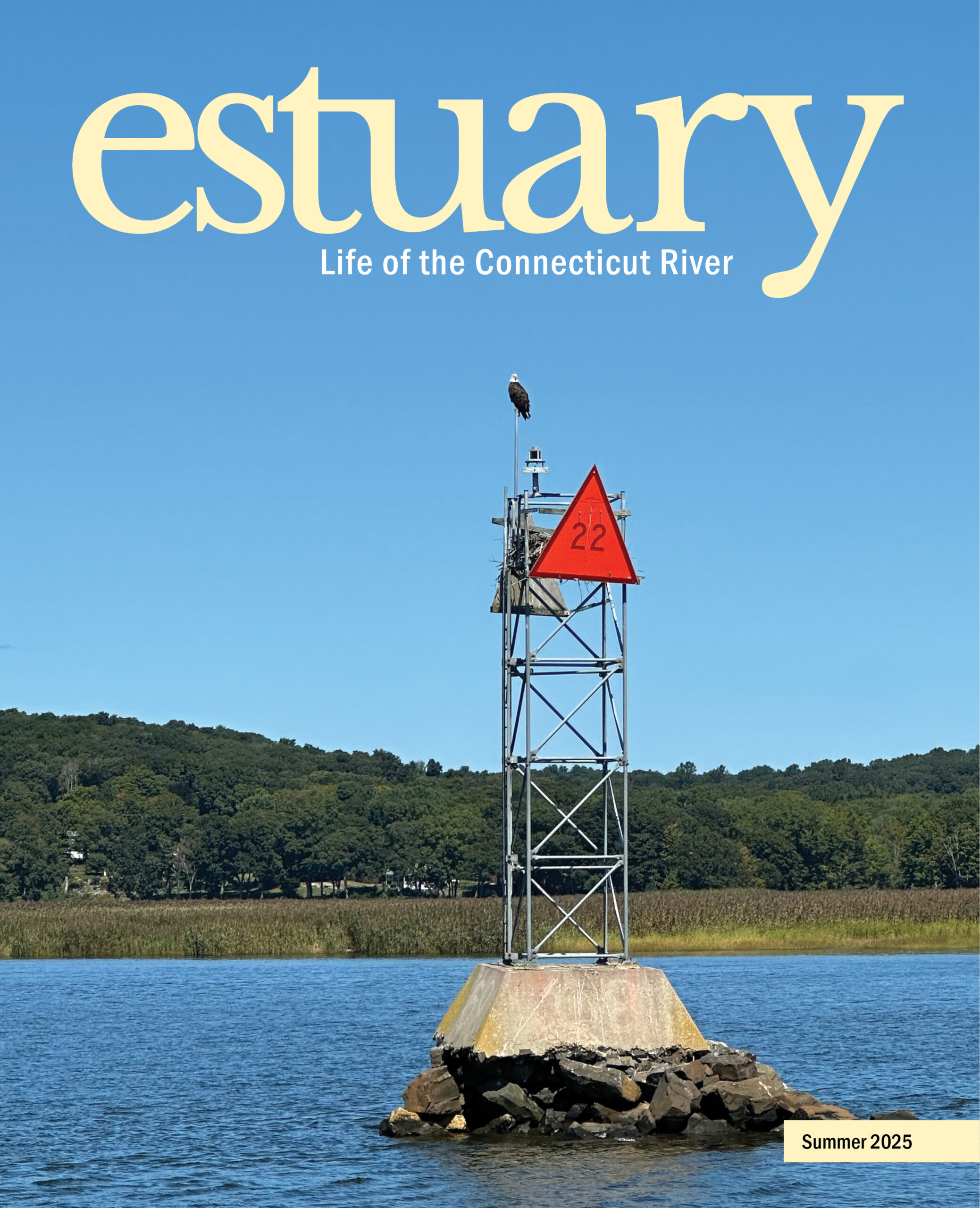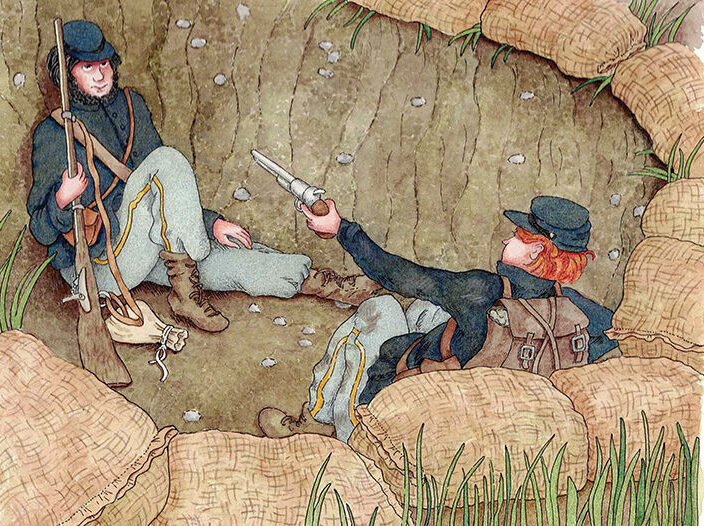 This article appears in the Summer 2025 issue
This article appears in the Summer 2025 issue

Chapter 18: Crossing The Field
Saybrook station. The conductor pushed the car door aside and, leaning out of the train, looked up and down the length of the platform for passengers, then called out, “Board!”
The moment for me to leave home had come; I was going off to war. We stood there finishing our goodbyes, Mum, Cap, and me. Cap gave me a strong handshake but guarded his smile; that’s his way when he needs to protect himself from getting too sentimental. Mum tucked a folded-up piece of paper into my shirt pocket then pressed her gloved palm against it. “Just a few lines of a prayer,” she said. “I wrote it out for you, from the Book of Common Prayer. Keep it always here, over your heart, and when you read it, know that I am praying every day for God to keep you safe from all harm and bring you home.”
I looked up the platform and saw that my cousin Ray had finished his goodbyes and was already climbing up onto the train. The whistle blew, the engine hissed, and the conductor called out a final, “All aboard!”

We slept well in the darkened train car as the hours passed until the officer shook us awake at 4 a.m. “Time to get to work, soldiers,” he said. We yawned, gathered our gear, and followed him to the open car door where a warm June wind blew in and woke us up the rest of the way. The train slowed to a crawl. I pulled my hat down firm on my head. The officer pointed into the night and said, “River’s that direction—west.”
I jumped from the train, hit the ground, and rolled, surprised to land in tall grass. Ray jumped after me, and we both took off running. I squinted, hoping to see reflections on the river, maybe whitecaps, something to let me know I was running in the right direction.
I ran like I was ahead of all the other runners in a foot race, covering good ground. I lengthened my stride, the tall grass smelled fresh and whooshed as I flattened it under my heavy boots. As my eyes adjusted to the dawn’s first light, I focused on some trees I could make out in the distance and what I thought might be the river. I was having a good run, like flying, when next thing I know my boot landed on nothing, and I pitched forward then down, and landed hard, knocking the wind out of me. I rolled and came to a stop on my back, staring up at the sky. “Spit,” I said.
“Good,” a voice said. “Company. Welcome to my foxhole.”
I pulled myself up onto my elbows and made out a figure seated on the ground, leaning back against a wall of dirt, just a few feet in front of me. I fumbled for my pistol, cocked it, and aimed it at the figure. “You Union?” I asked.
He laughed and said, “If I wasn’t, soldier, you’d have at least one bullet from this rifle clean through you by now. You’d have been easy to pick off, too, rolling around on your back like some helpless turtle.”
I holstered the pistol, sat up straight, and said, “The train dropped me off in this field, me and my cousin. I need to get to the river.”
“Out for a swim?”
“I’m a ferryman.”
“And that little pistol is all they give a ferryman to protect himself? Got a name, ferryman?”
“JJ, Sir. This little pistol is a Colt revolver. It fires cap and ball bullets. I loaded it on the train in case I ran into trouble getting to the river.”
He leaned forward a little and extended his right hand. “Earl. Pleased,” he said, nodding, and we shook hands.
“I heard shooting near the train, you must have heard it from here.”
“Trains are easy targets. That’s why your train dropped you in the middle of this field and not a station. River’s a couple hundred yards west. There’s a Rebel camp half-mile east of here, other side of the train tracks. Union camp is beyond those trees, near the river. That’s my unit, and yours, I suppose. So, what’s this about being a ferryman?”
“I served as a three-month Connecticut volunteer, right here, in Virginia. I helped build a pontoon bridge across that very river, the Rappahannock. That’s why the Army sent me here, this time with my cousin, Ray—he’s a ferryman, too. We’re here to man a steam ferry for transporting troops and supplies. The civilian owner abandoned the ferry.”
He loosened a string tied around one end of a muslin sack, opened it, and said, “Help yourself, hard tack and jerky. I’ll bet you signed up for three years—right?”
“Yes, Sir. Three years.”
“Not ‘Sir.’ Earl, please. Not me. Judge gave me a choice: prison or the Union Army.”
I was dying to know what he did to face prison time, but I figured, even if he murdered somebody, that would probably make him more fit for war, so I held my tongue. “Jerky’s good,” I said. “Thanks.”
“I got a wife and three little girls back—”
Earl had just started to tell me about his family when a bullet whistled low, through the grass, right over our heads.
“What the—?” Earl said. We ducked.
I heard Ray calling out my name. “That’s my cousin,” I said.
Earl got up on his knees, just far enough to look out and see Ray running toward us from the direction of the river. “Your cousin’s a fool! Next time that Reb won’t miss.”
Another shot flew over our heads. I poked my head up and saw Ray duck, then start running again. He was almost at the foxhole.
“JJ, behind you!” Ray shouted.
“I got him,” Earl said aiming his rifle.
I turned around, saw the shooter coming through the grass right at me. I drew my pistol and fired once, aiming for his knee but hit him in the calf instead. He dropped his rifle and folded over just as I fired a second shot, grazing the side of his head.
He collapsed to the ground just outside the foxhole.
“My leg! My leg! I can’t walk!” He struggled to reach for his rifle and screamed, “I’ll blow your head off, Yank!” But the strength went out of him, and he fell back, then passed out.
I climbed out of the foxhole and grabbed his rifle.
“You did mighty fine with that revolver, ferryman,” Earl said.
“Not such great aim,” I said. “Twice I missed what I was shooting for.”
Ray tumbled into the foxhole. I saw at once he’d been shot.
“You’re bleeding,” I said and peeled back the blood-soaked cloth of his shirt. The bullet had passed clean through the flesh of his upper arm, missing the bone.
“I’m fine,” Ray said, then pointing to Earl, “Who’s he?”
“He’s Earl,” I said. “We’re guests in his foxhole.”
“I told you that Reb wouldn’t miss a second time,” Earl said.
“We have to stop the bleeding,” I said.
“Here, take this sack.” Earl dumped the hard tack and jerky onto his lap, handed the muslin sack to me, and said, “I’ll say this for you, ferryman: first day out, and you make a kill before you even joined up with your unit.”
The Confederate soldier moaned and cried out in pain.
“Injured,” I said, “not dead.”
“You two need to get out of here,” Earl said. “I’ll cover for you.”
“River’s just beyond those trees,” Ray said, pointing west. “I came back to find you.”
“Hold still,” I said as I secured the muslin around his arm with the string. “We can’t leave that soldier in the field to die and be picked apart by the vultures.”
“You crazy, ferryman? This is war, you’re supposed to kill the enemy.”
“Kill, yes,” I said. “But, like hunting deer, it’s inhumane to leave an animal injured to die a slow, painful death.”
“JJ’s right,” Ray said. “You got to finish off a deer and carry him out.”
“Exactly!” Earl said. “So, then, finish that Reb off, ferryman. He’s your kill.”
In my mind Earl sounded a little too enthusiastic about finishing him off, which made me wonder if the prison time he escaped really was for murder.
The three of us crawled out of the foxhole and stood looking down at the injured soldier.
“Nope. Not right,” I said. “He’s unarmed. That’d be murder. We’ll have to take him prisoner for the Union.”
“Over my dead body,” the soldier moaned.
“See?” Earl said. “I told you. Now, shoot him in the head, send him on his way to paradise, and get going with your cousin here to that ferry.”
“Can’t do it. Rules of war,” I said. “Got to take him prisoner.”
“You crippled him,” Earl said, almost laughing. “He can’t walk.”
“That’s true,” I said, looking down at the soldier trying to guess his weight. “I’ll have to carry him.”
“You are one crazy ferryman,” Earl said, shaking his head.
“No, he’s right,” Ray said. “I read that. He’s wearing a Confederate soldier’s uniform, and he’s on a battlefield. If you maim him, and your conscience won’t let you leave him there to die, you can take him prisoner of war, but you’ve got to treat him good if you do.”
“They’ll have to amputate that leg if he’s not treated soon,” I said.
“Luckiest damn prisoner of war ever,” Earl said, giving the soldier a little kick in the side with the toe of his boot. “This is your lucky day, Reb.”
“Help me get him up and over my shoulders,” I said.
I squatted down, and Ray with his one usable arm and Earl with his attitude draped the unconscious soldier over my shoulders. We made our way slowly to the Union camp while Earl leaned on the edge of the foxhole facing east and covered for us, but there wasn’t any more shooting.
“JJ? What exactly are we going to do with him?”
“Well, first thing is to pray there’s a medic in that camp, Ray, or he’ll bleed to death before day’s end.”
“It’s a great ferry, JJ—wait ’til you see it. She’s a honey.”
Leslie Tryon is an award-winning author-illustrator of children’s books (Simon & Schuster publisher). Five generations of Tryon’s family served as ferrymen on the Connecticut River between Old Saybrook and Old Lyme, Connecticut, and many of those men were named JJ.
Historical Note
According to the American Battlefield Trust, the Union took approximately 214,000 Confederate soldiers prisoner during the Civil War. President Abraham Lincoln asked legal scholar Francis Lieber to write up a standard code of conduct for Union soldiers to follow during the war. The code stated that a prisoner must be given basic rights, treated humanely, given food, water, and shelter, and his injuries treated. The captured soldier was not a prisoner of the individual who captured him, but a prisoner of the government. It was called the Lieber Code.
